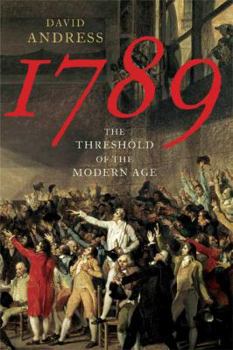1789: The Threshold of the Modern Age
Select Format
Select Condition 
Book Overview
From the inauguration of George Washington to the birth of the cotton trade in the American South, from the British Empire's war in India to the street battles of the French evolution, Andress shows how the struggles of this explosive year would dominate the Old and New Worlds for the next 200 years.
Format:Hardcover
Language:English
ISBN:0374100136
ISBN13:9780374100131
Release Date:March 2009
Publisher:Farrar Straus Giroux
Length:439 Pages
Weight:1.70 lbs.
Dimensions:1.5" x 6.4" x 9.1"
Customer Reviews
3 ratings
Worth the Wade
Published by Thriftbooks.com User , 14 years ago
I'm enjoying 1789, although it seems like it is a bit overwritten. I teach high school World History so maybe I have a filter that always tells me what my students could or could not do with history reading. I want a version that they could/would read! That said, the book challenges a number of the standard textbook views of pre-revolutionary France. It also is fun to have the tri-cornered comparison of US, GB and France.
A New Slant On Epochal Events
Published by Thriftbooks.com User , 15 years ago
Reams of prose, both fiction and non-, have been written about the revolutionary events that commenced with 1789. David Andress, a noted historian who has already contributed to the scholarship on that period with his work, The Terror, takes a new slant on this age of upheaval by taking a synoptic view of events as they contemporaneously occurred in the United States, Great Britain, and France. Despite this fairly novel approach, most of the personalities, situations, and anecdotes which Andress relates will be familiar to students of the period. His approach does pay dividends when he focuses on subjects such as how the American experience with creating a constitution influenced and changed French efforts to do the same for their own country. His synthesis of events works particularly well in his discussion of the growth and evolution of the cotton industry, vividly illustrating how the nascent Industrial Revolution was given impetus. I recommend this book to anyone with an interest in the French Revolution or in 18th century history in general.
1789: A scholarly examination of France, Great Britain and the United States in a year of revolution
Published by Thriftbooks.com User , 15 years ago
1789 was a monumental year in history. In this new and soberly written work the British scholar David Andress explores in depth the developments of that year. We learn from these pages that: France was in the throes of the beginning of the French Revolution with the attack on the Bastille in July, 1789. Louis XVI, Marie Antoinette and their hedonistic court were reactionary and oppposed to any changes in the ancien regime. Attempts by finance wizards such as Necker were unable to staunch the bloody mortal wounds inflicted on the Gallic body politic. France was ravaged by poor crops, a harsh winter, starvation and rural unrest among the peasantry. Taxes were high as France became bankrupt following participation in the American Revolution and loss in the Seven Years War (1756-63). Works of such men as Voltaire, Mireabeau and Thomas Paine called for radical change in the government. The Church was corrupt. The meetings of the Estates General in the spring and summer which had not met since 1614 saw the emergence of the third estate of middle class persons eager to bring down the aristocracy. France would later execute the King and be forced into European warfare against defenders of the divine right of Kings. Napoleon would emerge to lead the land to total defeat at Waterloo and a return to monarchy in 1815.A huge slave revolt in Hati was defeated but caused widespread alarm at natives who dared to rise up to defy their imperial masters. Great Britain was reeling from defeat inflicted in the American Revolution. King George III went mad for a time leading to parliamentary jousting between Whigs under Charles Jame Fox who favored a regency for George IV and defenders of the king. which was the position of th Tories Edmund Burke became noted for his parliamentary assaults on the French Revolution. The trial of Warren Hastings for his viceroyship of India was controversial. The East India Company which ran India was corrupt and looted the the subcontinent for all it was worth. The Industrial Revolution first occurred on a large scale in England where industrial towns such as Birmingham, Manchester and the largest city in the world at the time London became powerhouses in a burgeoning urban based economy. William Pitt the younger served as Prime Minister employing his brilliance to keeping the worldwide empire moving forward. The young United States succeeded in replacing the ineffective Articles of Confederation with the Constitution and Bill of Rights defended by such men as the erudite James Madison. George Washington was elected the first president and Jefferson and Franklin represented the new democracy as ambassadors to France. The plague of chattel slavery continued driving a deeper wedge between abolitionist voices and those defending the evil practice. William Wilbeforce worked hard in England to end the slave trade. Progress in the US lagged behind this effort. David Andress has written a good book on the year including many short biogr






